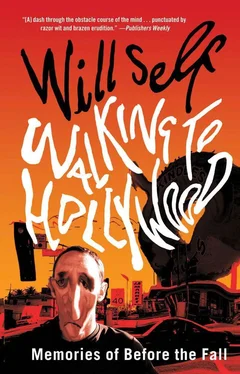Will Self - Walking to Hollywood
Здесь есть возможность читать онлайн «Will Self - Walking to Hollywood» весь текст электронной книги совершенно бесплатно (целиком полную версию без сокращений). В некоторых случаях можно слушать аудио, скачать через торрент в формате fb2 и присутствует краткое содержание. Год выпуска: 2011, Издательство: Grove/Atlantic, Inc., Жанр: Современная проза, на английском языке. Описание произведения, (предисловие) а так же отзывы посетителей доступны на портале библиотеки ЛибКат.
- Название:Walking to Hollywood
- Автор:
- Издательство:Grove/Atlantic, Inc.
- Жанр:
- Год:2011
- ISBN:нет данных
- Рейтинг книги:4 / 5. Голосов: 1
-
Избранное:Добавить в избранное
- Отзывы:
-
Ваша оценка:
- 80
- 1
- 2
- 3
- 4
- 5
Walking to Hollywood: краткое содержание, описание и аннотация
Предлагаем к чтению аннотацию, описание, краткое содержание или предисловие (зависит от того, что написал сам автор книги «Walking to Hollywood»). Если вы не нашли необходимую информацию о книге — напишите в комментариях, мы постараемся отыскать её.
Walking to Hollywood — читать онлайн бесплатно полную книгу (весь текст) целиком
Ниже представлен текст книги, разбитый по страницам. Система сохранения места последней прочитанной страницы, позволяет с удобством читать онлайн бесплатно книгу «Walking to Hollywood», без необходимости каждый раз заново искать на чём Вы остановились. Поставьте закладку, и сможете в любой момент перейти на страницу, на которой закончили чтение.
Интервал:
Закладка:
The obvious rejoinder — as a person of restricted height Sherman was not that archetypal — died in my mouth. Had I uttered it when riled, I may have been unable to prevent myself asking him not only why he scaled up his own height to mine, but also why he thought no one else had done the calculation. This seemed especially bizarre, given a recent public exhibition had involved one hundred ‘life-sized’ Shermans being ranged right along Hadrian’s Wall — yet nobody pointed out that all of them were six-footers.
It made me ponder whether my own guilt was only a subsection of a more widespread shame. Perhaps the unacknowledged six-foot dwarfs were evidence of a collective uneasiness about the sizeism that dare not speak its name? Or maybe — in Britain and, increasingly, the States as well — the scaling up of the small was registered, albeit unconsciously, as a just commentary on the misadventures of post-imperial nations that were in stature denial, and went on punching above their weight in the world arena, KOing hundreds of thousands of blameless everymanikins?
So, I said nothing in the Heavenly Empire, and I said still less up on the Downs; where we walked on, with Sherman fleshing out the impression of his next week’s itinerary that I had been given by the phone call. The tent and crampons were needed for a trip up on to the Grosser Aletsch glacier, where the installation of an heroic group of Shermans — the central one standing 37 metres, and surrounded by five more half that size — was being strenuously fought by what the artist termed ‘a bathetic coalition of tree-huggers and chalet maids’, with whose positions, nonetheless, he sympathized.
It was at the core of Sherman’s steely grace that he refused his disability the right to dictate his physical limitations. When he was young this had seemed feisty; now he was middle aged it had taken on an almost mystical character. Sherman Oaks couldn’t gaze upon lake, river or sea without stripping off and diving into it. Confronted by a rocky wall or an icy defile, he would insist on scrambling up it. If on our rambles we came across signs prohibiting access or fences barring it, Sherman was duty bound to trespass.
Thus he kicked against the pricks — but they remained big ones. He had great energy but it was wearisome for him to walk more than a mile or two. So he was almost always attended by his driver, Baltie (short for Balthazar), a dim old Etonian, who, as Sherman put it — out of his earshot — ‘Rather than being equipped with an elaborate and expensive education should’ve aged fourteen been packed off to deliver groceries!’
On this particular day Baltie had picked us up in the Range Rover where the train halted at Plumpton Racecourse. Then he drove us up a track on to the Downs, and Sherman walked with me to Ditchling Beacon; then, in his own coinage, he ‘called in a Baltie-strike’. I next saw him at Saddlescombe, where he clambered down from the car and accompanied me to the Devil’s Dyke.
Such a punctuated companionship did have its advantages: being with Sherman for more than an hour or two at a time was de trop . The constant phone calls, the bluster, the charging into fields with bulls in them — it all grew wearing; besides, I also needed time alone to process (the therapese is warranted here) certain psychological symptoms that had been latent in me for many years, and were now coming disturbingly to the fore.


Were those the shreds of black plastic bags caught on the legs of the pylons that strode over the hills? Or were they the clothes of plane-crash victims who in death had transgressed the first commandment of globalism: keep your belongings with you at all times? Was there any more distressing sight to behold than television news images of rayon blouses, frumpy brown skirts and smalls unlaundered for the entire fortnight, now caught in the bushes at the airport’s perimeter? To say nothing of the holdalls and suitcases that lay ruptured like sickeningly burst boils. Enfin , the corpses, neatly packed away in body bags, all they once possessed having already been decanted.
In eleven days’ time I was due to leave for a fortnight’s book tour, heading first to Toronto and then on to several cities in the USA. Due to, but I was questioning whether I could go at all, since my as yet unpacked bag dragged on me like an anchor. Of course, I had long since dispensed with anything but carry-on and was taking only a small rucksack — and not one of those pantechnicons you see being hauled up the aisle, a shotgun marriage between human and trunk. The lapwing pee-witting up above me, the ladybird millimetring along the buttercup at my feet, the red kite swooping between me and Fulking, or the rabbit hopping across the chalky path — were they so encumbered? I yearned in my own life to re-create Duchamp’s Boîte-en-valise by stylizing my impedimenta over and over again, each time reducing the scale of books, clothing and toiletries, until all I took with me was a sheaf of sketches slipped inside my wallet. Nowadays, the thought of carrying anything more seemed grotesque, making of my world an n th-class cabin into which — my greasepaint moustache shining — I manoeuvred the steamer trunk packed with the other Capitalist Brothers.

At the Devil’s Dyke, Sherman and I sat on a bench. I wanted to tell him the folk tale associated with this great V-shape gouged out of the chalk escarpment. How the Devil, bent on flooding the Sussex Weald so as to drown all its sleeping cotters, one night set to with his mighty spade, aiming to dig a ditch through the Downs. But an old woman living alone in a farmhouse awoke in the small hours and lit her lamp. Satan, fearing the dawn, cast his tool aside and with a howl leapt all the way across the Weald to the North Downs, where he landed, thus creating the enormous depression now known as the Devil’s Punchbowl.
Wanted to — but couldn’t, because Sherman, while chewing a pizzle of biltong I’d handed him, was on the phone to a powerful arts Gauleiter half a world away, etching with incisive verbalizations his plan to implant the crater of Rano Kau, the volcano at the south-west corner of Easter Island, with scores — if not hundreds — of carved basalt Shermans, latter-day moai that, like those celebrated statues, would awe visitors by the sheer implausibility of their being in that place at all.
‘Make it happen!’ Sherman cried, then turning to me said, ‘So, what were you saying?’ But then he was interrupted once more by the fo-fiddle-i-o of contemporaneity, so that while he exchanged yelps with some willowy curator in a Berlin bunker I was left to tell myself that the destination for this trip was Lancing College, which stood on its knoll on the far side of the River Adur. My father and uncle had been educated there, and the neo-Gothic pile loomed large in the family mythology, having been founded by my great-great-grandfather, Nathaniel Woodard.
His photograph — an original daguerreotype — had hung in the gloomy stairwell between the second and third storeys of my grandparents’ house on Vernon Terrace in Brighton, throughout the interminable Sunday afternoons of my childhood. It now hung in exactly the same position in my own terraced house in South London. The High Anglican churchman, and apostle of public school education to the rising middle classes, sat, life sized, behind thick glass, edged in gilt and framed with black mahogany, his expression at once stern and soppy, his cheeks furry.
Читать дальшеИнтервал:
Закладка:
Похожие книги на «Walking to Hollywood»
Представляем Вашему вниманию похожие книги на «Walking to Hollywood» списком для выбора. Мы отобрали схожую по названию и смыслу литературу в надежде предоставить читателям больше вариантов отыскать новые, интересные, ещё непрочитанные произведения.
Обсуждение, отзывы о книге «Walking to Hollywood» и просто собственные мнения читателей. Оставьте ваши комментарии, напишите, что Вы думаете о произведении, его смысле или главных героях. Укажите что конкретно понравилось, а что нет, и почему Вы так считаете.












